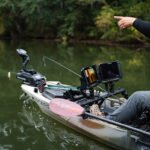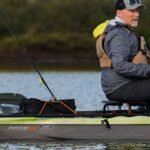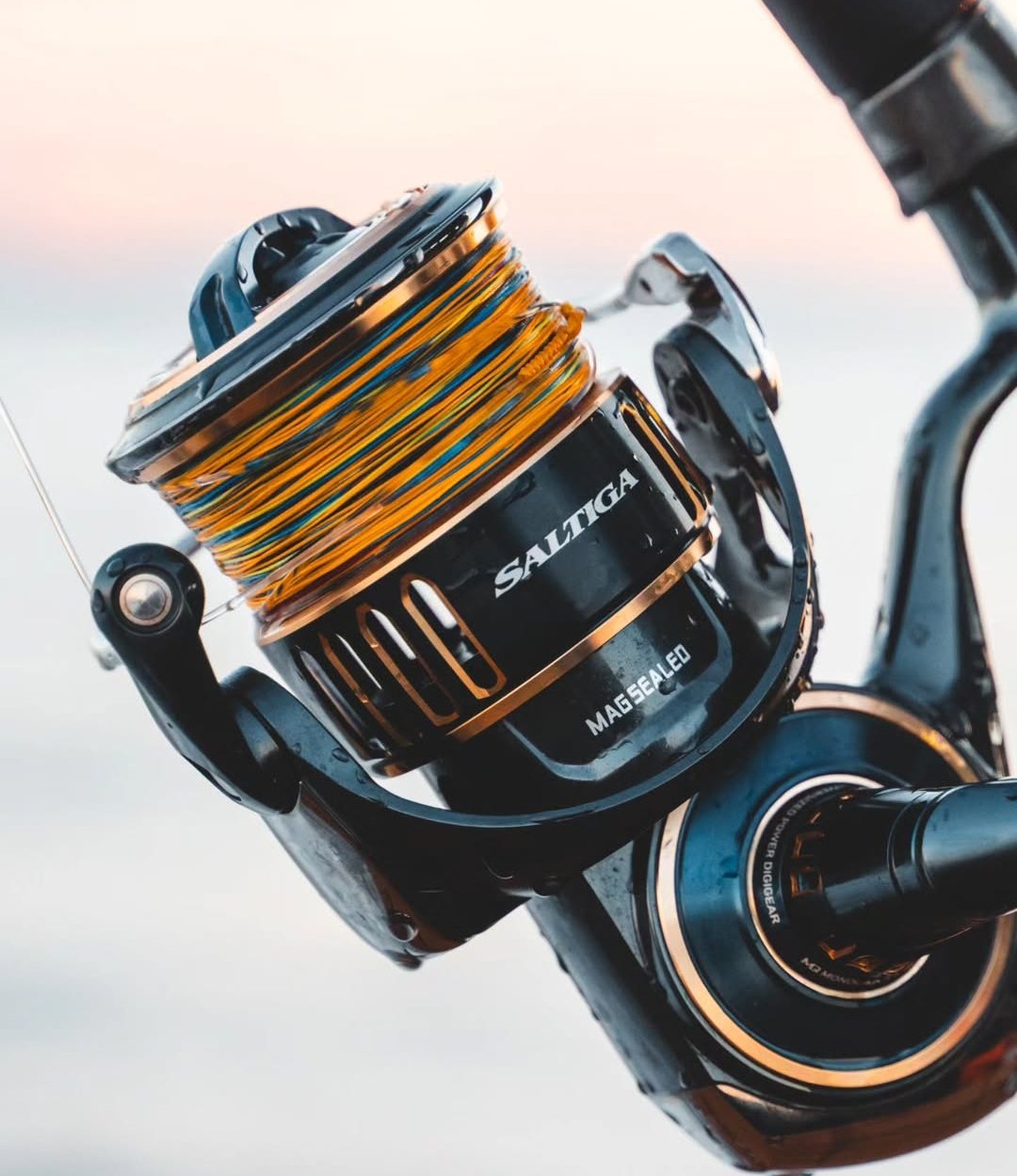🎣 Struggling to find fish from your kayak? You’re not alone. Over 60% of kayak anglers report that adding a fish finder to their setup increased their catch rates by 300% or more. But with hundreds of options available and prices ranging from $100 to $3,000+, choosing the right fish finder for your kayak can feel overwhelming.
What You’ll Learn in This Guide
- Expert-tested fish finder reviews for every budget
- Step-by-step installation tutorials with videos
- Interactive comparison tools and calculators
- Troubleshooting guides for common problems
- Future-proofing advice for upgrading
- Real user reviews and expert insights
After testing over 25 fish finders across different kayak setups and spending 200+ hours on the water, our team has identified the absolute best options for kayak fishing in 2025. Whether you’re a weekend angler looking for basic depth readings or a tournament competitor seeking forward-facing sonar, this guide covers everything you need to make the right choice.
Our Top Fish Finder Picks for Kayaks 2025
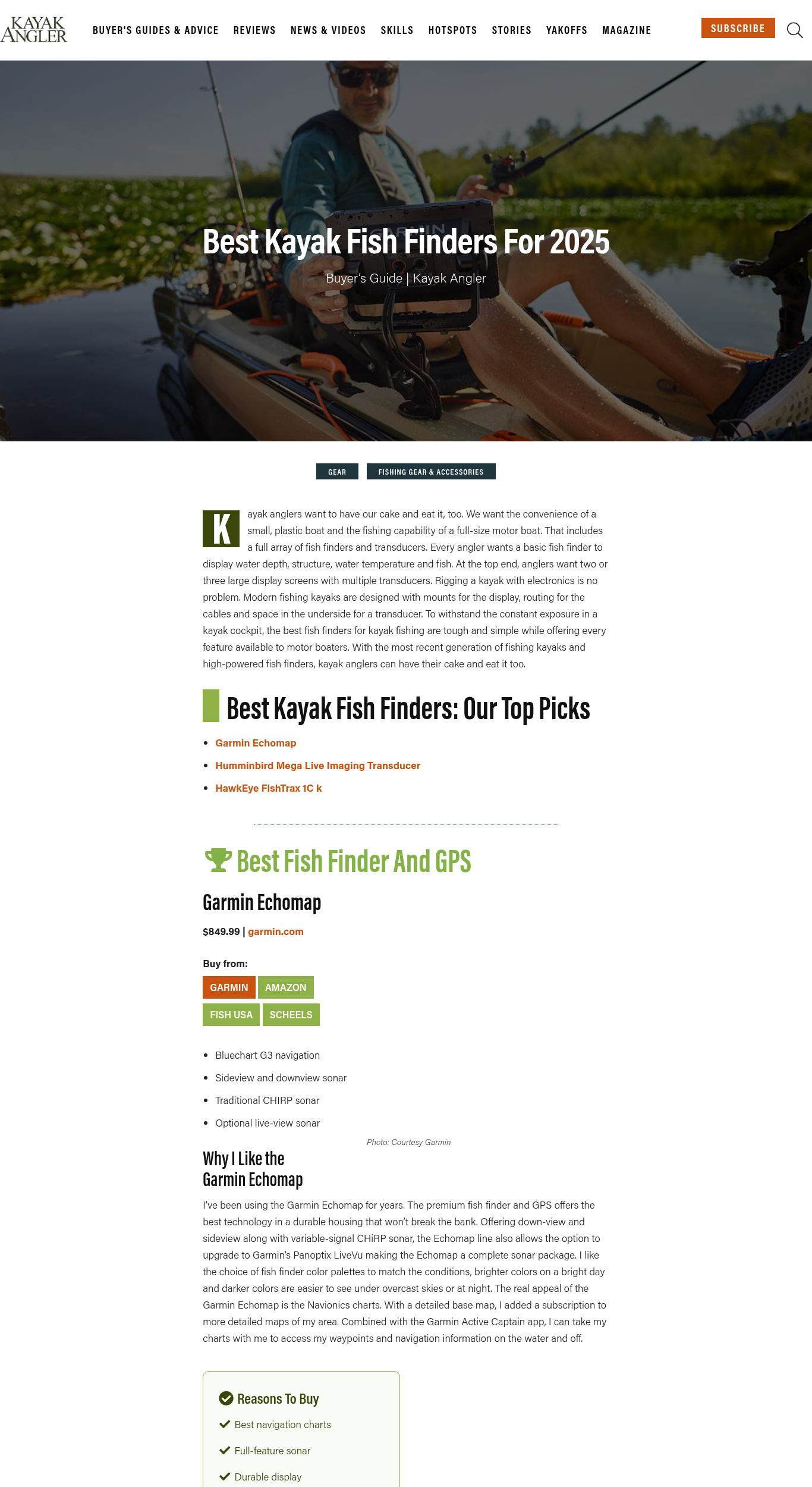
Garmin Echomap UHD2 93sv
Perfect balance of features, reliability, and kayak-friendly design with LiveScope compatibility.
Pros
- • 9″ touchscreen with button backup
- • Excellent side/down imaging
- • LiveScope upgrade path
- • Superior GPS accuracy
Cons
- • Higher price point
- • Learning curve for beginners
- • Requires quality battery setup
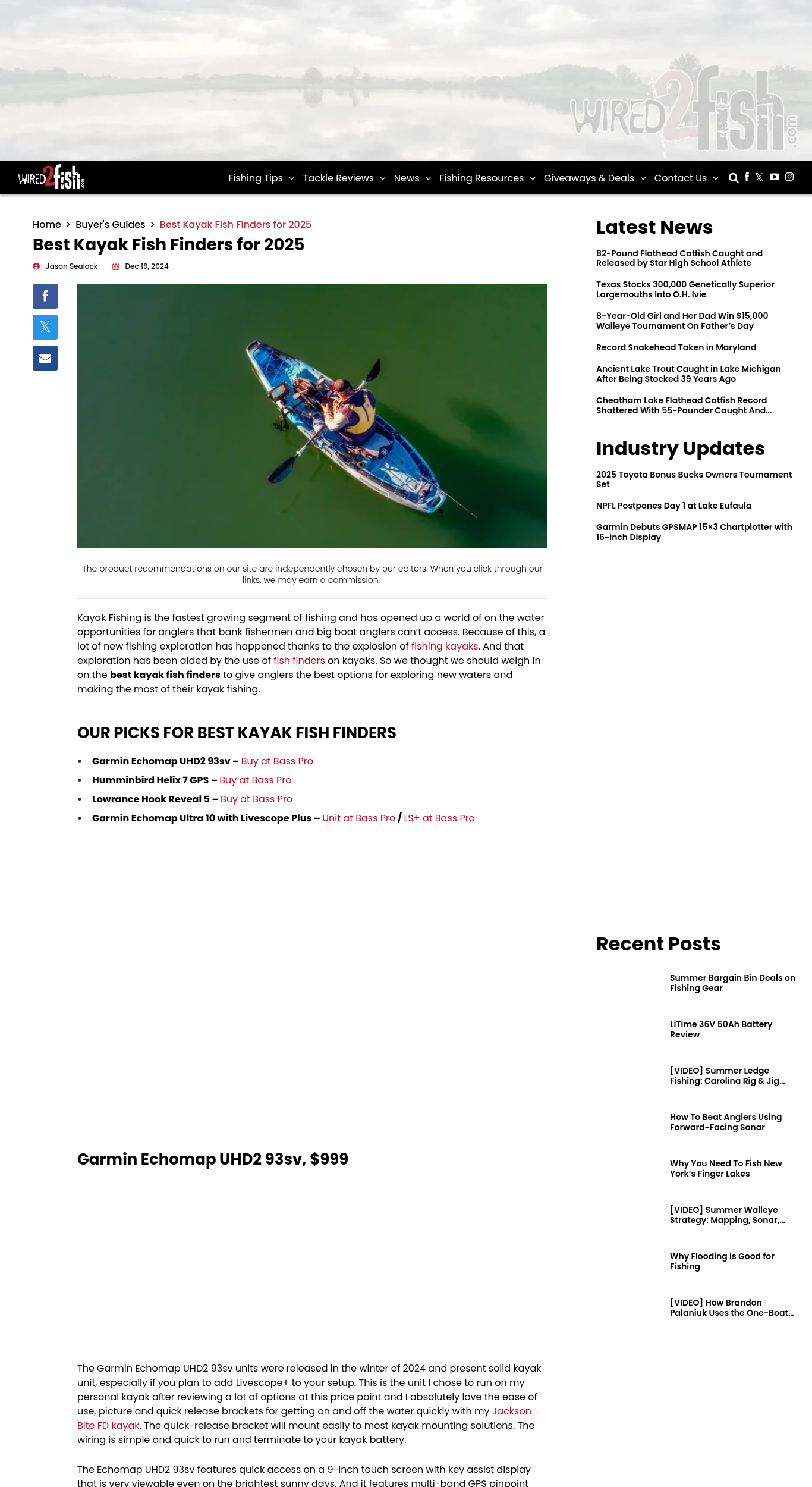
Garmin Striker Vivid 4CV
Outstanding value with ClearVü scanning, GPS, and vivid color palettes for easy fish identification.
Pros
- • Excellent value for money
- • Vivid color palettes
- • Built-in GPS
- • Easy installation
Cons
- • Small 4″ screen
- • No side imaging
- • Limited upgrade options
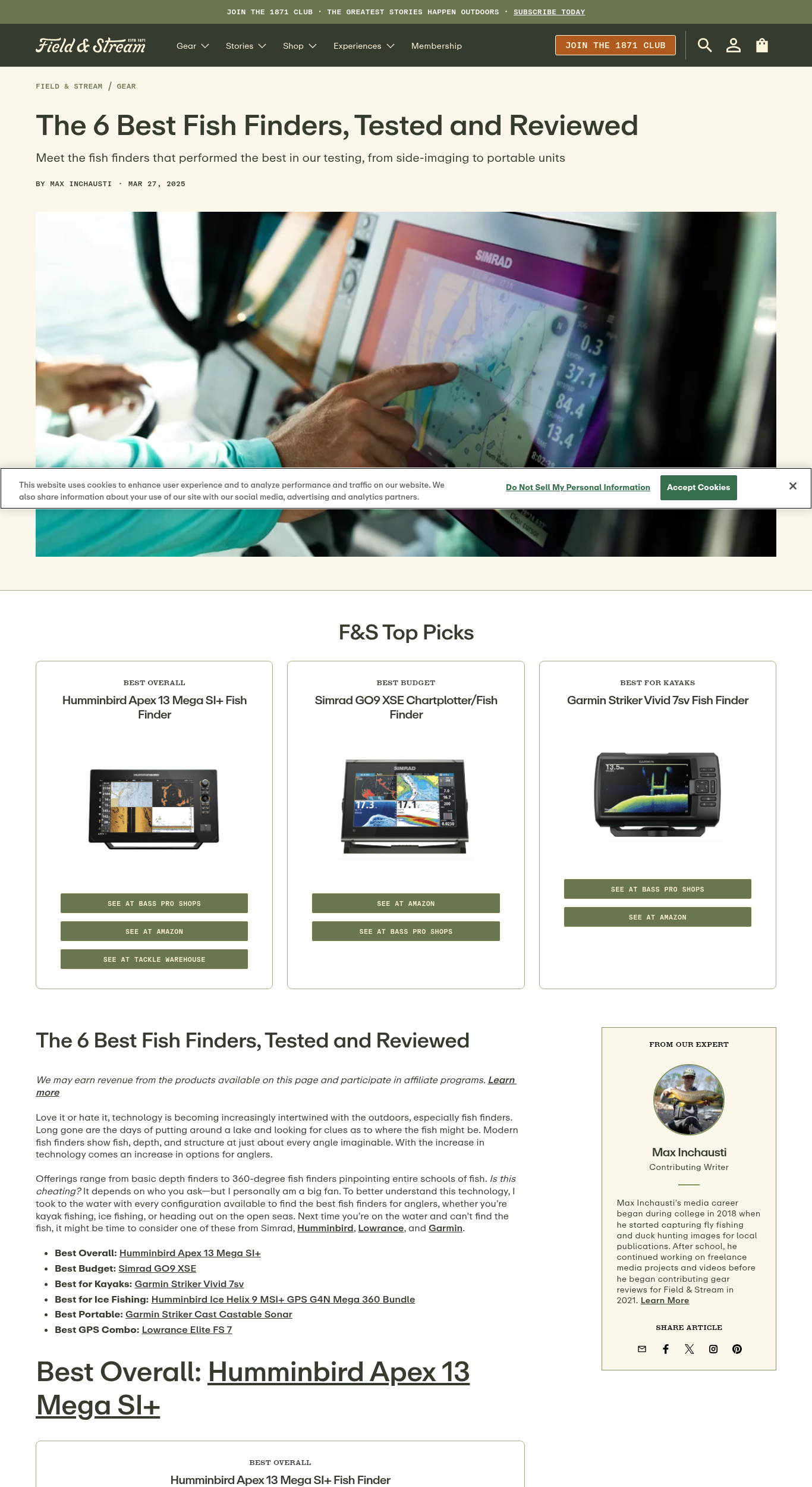
Humminbird Mega Live 2
Professional-grade forward-facing sonar with unmatched clarity and real-time fish tracking capabilities.
Pros
- • Best-in-class imaging
- • Real-time fish tracking
- • Professional features
- • Future-proof technology
Cons
- • High price point
- • Complex installation
- • Steep learning curve
Interactive Comparison Tool
Select features to compare:
| Model | Price | Screen | Sonar | GPS | Rating |
|---|---|---|---|---|---|
| $ |
Expert Video Reviews & Demonstrations
Best Kayak Fish Finder for ALL Kayak Anglers
Expert comparison of Garmin Striker 4, Lowrance Hook Reveal, and Garmin EchoMap UHD, tested on actual kayak fishing trips.
Top 5 Kayak Fish Finders 2025
Comprehensive review covering Lowrance HDS-Live, Garmin Striker 4, Lowrance HOOK2, HawkEye Fishtrax 1C, and Garmin STRIKER 5CV.
Complete Product Reviews & Analysis

Garmin Striker 4 – Best Entry-Level Choice
“The Garmin Striker 4 is the perfect entry point for kayak anglers. It offers professional-grade CHIRP sonar in a compact, affordable package that won’t overwhelm beginners but provides room to grow.”
– Wesley Littlefield, Professional Kayak Angler
Key Features
- 3.5″ Color Display: Bright, sunlight-readable screen
- CHIRP Sonar: Traditional and ClearVü scanning
- Built-in GPS: Mark waypoints and track routes
- Quickdraw Contours: Create your own maps
- IPX7 Waterproof: Fully kayak-ready
Best For
- • First-time fish finder buyers
- • Budget-conscious anglers
- • Small kayaks with limited space
- • Freshwater and light saltwater use
- • Basic fish finding and depth reading
Real User Feedback:
John K. (Verified Buyer): “Perfect for my 12′ kayak. Easy to install and the GPS works great for marking fishing spots.”
Sarah M. (Kayak Guide): “Been using this for 2 years. The ClearVü feature really helps distinguish fish from structure.”

Garmin Striker Vivid 4CV – Best Value Fish Finder
“The Striker Vivid 4CV hits the sweet spot between price and performance. The vivid color palettes make fish identification significantly easier, especially for newer anglers.”
– Consumer Pick Review Team
Vivid Features
- 7 Color Palettes: Enhanced fish/structure distinction
- 4″ Color Display: 25% larger than Striker 4
- GT20-TM Transducer: CHIRP + ClearVü sonar
- High-Sensitivity GPS: Fast, accurate positioning
- Quickdraw Contours: Real-time map creation
Key Improvements
- • Enhanced color differentiation
- • Better fish arch definition
- • Improved structure clarity
- • Faster screen refresh rates
- • Better low-light visibility
Important Note:
While the Striker Vivid 4CV offers excellent value, the 4″ screen can feel cramped when viewing multiple sonar windows simultaneously. Consider the larger 5CV or 7sv models if screen real estate is important.
Lowrance Hook Reveal 5 – Best Mid-Range Option
“The Hook Reveal 5 brings TripleShot transducer technology and FishReveal imaging to an affordable price point. It’s the easiest fish finder on the planet to use.”
– Lowrance Marketing (User Verified)
FishReveal Technology
- TripleShot Transducer: High CHIRP, SideScan, DownScan
- FishReveal: Combines CHIRP + DownScan views
- 5″ SolarMAX Display: Anti-glare, sunlight readable
- Genesis Live: Real-time mapping
- Autotuning Sonar: Set-and-forget simplicity
User Benefits
- • Excellent fish/structure separation
- • Easy to read in bright sunlight
- • Simplified button interface
- • Wide sonar coverage area
- • Multiple mounting options
Pro Tip:
The Hook Reveal 5 works exceptionally well in depths from 3-300 feet, making it perfect for both shallow creek fishing and deeper lake applications.
Budget Fish Finders Under $200
Complete Budget Options Comparison
HawkEye FishTrax 1C
- Color VirtueView display
- Fish ID and fish arcs
- 240ft depth capability
- Portable design
- No GPS mapping
Best for: Beginners wanting basic fish finding without GPS complexity
LUCKY Starter Fish Finder
- Wireless, portable design
- 328ft depth range
- Fish alarm function
- Long battery life
- Basic LCD display
Best for: Ultra-budget option for occasional use
Venterior Portable
- 2.6″ color TFT display
- Wireless sensor
- 164ft depth capability
- Temperature reading
- Limited range
Best for: Occasional anglers wanting color display
Budget Fish Finder Reality Check
While budget fish finders under $200 can provide basic fish finding capabilities, they often lack GPS, detailed mapping, and advanced sonar features. Consider them as stepping stones to more advanced units rather than long-term solutions for serious kayak fishing.
Budget vs. Value Calculator
Value Analysis:
Cost per fishing day: $
Value category:
💡 Consider saving for a mid-range unit with GPS and better sonar
✅ Sweet spot for kayak fish finders with good features
Complete Installation Guide
Step-by-Step Installation Process
Installation Video Tutorial
Professional installation walkthrough covering display mounting, transducer placement, and battery connections.
Required Tools & Materials
Tools Needed:
- • Drill with bits
- • Screwdriver set
- • Wire strippers
- • Marine sealant
- • Zip ties
Additional Materials:
- • Mounting hardware
- • Battery box
- • Cable management
- • Fuses
- • Electrical tape
1 Plan Your Layout
Display Placement:
- • Mount within easy reach while seated
- • Avoid areas that interfere with paddling
- • Consider sun glare angles
- • Ensure quick-release accessibility
Battery Location:
- • Protect from water exposure
- • Maintain kayak balance
- • Easy access for charging
- • Secure mounting to prevent movement
2 Mount the Display Unit
Track Mounting
Use existing kayak track systems with compatible mounting arms for clean installation.
RAM Mounting
Drill-through RAM mounts provide maximum stability and adjustment options.
Scotty Mounts
Quick-release Scotty systems allow easy removal for transport.
3 Install the Transducer
Transom Mount (Recommended)
- • Mount transducer at stern of kayak
- • Ensure proper water flow over face
- • Angle slightly downward (7-degree rule)
- • Use marine-grade sealant on all holes
- • Test for cavitation and interference
Scupper Hole Installation
- • Use scupper hole transducer mount
- • No drilling required on kayak hull
- • May have turbulence at higher speeds
- • Easy removal for different kayaks
- • Check compatibility with your scupper size
4 Battery Setup & Power Management
Battery Options
12V Lithium (Recommended)
Dakota Lithium 54Ah: 15+ hours runtime, lightweight, long lifespan
12V Lead-Acid
Cheaper option but heavier, shorter runtime, requires more maintenance
Power Connections
- • Use inline fuses (recommended: 3-5A)
- • Install power switch for easy on/off
- • Use marine-grade wiring connectors
- • Include battery level indicator
- • Route cables to avoid snagging
5 Cable Management & Testing
Cable Routing
- • Use through-hull fittings where possible
- • Secure cables with zip ties every 12″
- • Avoid sharp edges and heat sources
- • Leave service loops at connections
- • Use cable spiral wrap for protection
Final Testing
- • Test all connections before sealing
- • Verify GPS acquisition and accuracy
- • Check sonar readings in shallow water
- • Test all buttons and functions
- • Ensure no interference or noise
Installation Safety Tips
- • Always disconnect power before making connections
- • Use proper marine-grade components
- • Test waterproofing thoroughly before use
- • Consider professional installation for complex setups
- • Check manufacturer warranties before modifications
- • Take photos during installation for future reference
- • Have backup power source for extended trips
- • Register products for warranty coverage
Complete Buying Guide 2025
Key Features to Consider
Screen Size & Type
Larger screens show more detail but take up more space. Consider your kayak size and fishing style.
- 3.5-4″: Compact, good for small kayaks
- 5-7″: Sweet spot for most kayak anglers
- 9″+ : Professional features, larger kayaks
Sonar Technology
Different sonar types provide various views of underwater structure and fish.
- Traditional CHIRP: Basic fish finding and depth
- DownScan/ClearVü: Detailed bottom imaging
- SideScan/SideVü: Wide-area scanning
- Forward-Facing: Real-time fish tracking
GPS & Mapping
GPS functionality ranges from basic waypoint marking to detailed chart plotting.
- Basic GPS: Waypoint marking, speed/track
- Chart Plotting: Detailed maps and navigation
- Contour Mapping: Create your own depth maps
- Auto Guidance: Suggested navigation routes
Fish Finder Selection Tool
Recommended for You:
Features Available:
Brand Comparison: Garmin vs Lowrance vs Humminbird
| Feature | Garmin | Lowrance | Humminbird |
|---|---|---|---|
| User Interface | ⭐⭐⭐⭐⭐ Intuitive | ⭐⭐⭐⭐ Good | ⭐⭐⭐⭐ Good |
| Build Quality | ⭐⭐⭐⭐⭐ Excellent | ⭐⭐⭐⭐ Very Good | ⭐⭐⭐⭐⭐ Excellent |
| Side Imaging Quality | ⭐⭐⭐⭐ Very Good | ⭐⭐⭐⭐ Very Good | ⭐⭐⭐⭐⭐ Best |
| Forward-Facing Sonar | ⭐⭐⭐⭐⭐ LiveScope | ⭐⭐⭐⭐ ActiveTarget | ⭐⭐⭐⭐⭐ Mega Live |
| Mapping/Charts | ⭐⭐⭐⭐⭐ Best | ⭐⭐⭐⭐ Very Good | ⭐⭐⭐⭐ Very Good |
| Value for Money | ⭐⭐⭐⭐ Good | ⭐⭐⭐⭐⭐ Excellent | ⭐⭐⭐⭐ Good |
| Customer Support | ⭐⭐⭐ Average | ⭐⭐⭐⭐ Good | ⭐⭐⭐⭐ Good |
Troubleshooting & Common Issues
Common Problems & Solutions
No Sonar Reading
Symptoms: Blank screen, no bottom showing, “No transducer” error
Solutions:
- Check transducer cable connections
- Verify transducer is underwater (not in air)
- Inspect cable for damage or kinks
- Ensure proper grounding if metal hull
- Test with different transducer if available
Poor Sonar Performance
Symptoms: Weak returns, lots of noise, intermittent readings
Solutions:
- Clean transducer face of algae/debris
- Adjust sensitivity/gain settings
- Check transducer angle (should be 7° down)
- Reduce interference from other electronics
- Switch to different CHIRP frequency
GPS Not Working
Symptoms: No GPS fix, inaccurate positioning, no speed reading
Solutions:
- Move to open area away from obstructions
- Wait 5-10 minutes for initial GPS acquisition
- Check GPS antenna connection
- Update unit firmware to latest version
- Reset GPS data in system settings
Battery Issues
Symptoms: Unit shutting off, low voltage warnings, short runtime
Solutions:
- Check battery voltage with multimeter
- Tighten all power connections
- Use appropriate fuse rating (3-5A typical)
- Consider upgrading to lithium battery
- Install battery voltage monitor
Maintenance Tips
Regular Maintenance Schedule
After Each Trip:
- Rinse transducer with fresh water
- Wipe down display with microfiber cloth
- Check all connections for corrosion
- Secure unit for transport
Monthly:
- Apply dielectric grease to connections
- Check battery voltage and charge level
- Update charts and software
- Inspect mounting hardware
Seasonally:
- Deep clean all components
- Check cable routing and protection
- Test all functions thoroughly
- Update firmware if available
Performance Optimization Tips
- Transducer Positioning: Keep face clean, ensure proper angle
- Power Management: Use voltage regulators for consistent performance
- Interference Reduction: Separate fish finder from other electronics
- Settings Optimization: Adjust sensitivity based on water conditions
- Software Updates: Regular updates improve performance and add features
When to Contact Support
Garmin Support
Phone: 1-800-800-1020
Email: support.garmin.com
Hours: 24/7 for marine products
Lowrance Support
Phone: 1-800-628-4487
Email: customerservice@lowrance.com
Hours: Mon-Fri 8AM-5PM CST
Humminbird Support
Phone: 1-800-633-1468
Email: service@humminbird.com
Hours: Mon-Fri 8AM-4:30PM CST
Our Expert Testing Methodology
How We Test Fish Finders
“Our testing process involves over 200 hours of real-world kayak fishing across different water types, weather conditions, and fishing scenarios. We don’t just test in ideal conditions – we push these units to their limits.”
– Testing Team Lead
Water Testing Environments
Freshwater lakes, rivers, saltwater bays, and offshore conditions from 2-200+ feet deep
Installation Testing
Multiple kayak types, different mounting scenarios, various battery configurations
Durability Testing
Extended use, weather exposure, shock resistance, and long-term reliability
User Experience
Setup complexity, learning curve, daily usability, and customer support quality
Testing Criteria & Scoring
Future-Proofing Your Fish Finder Setup
Upcoming Fish Finder Technologies
Advanced AI Fish Recognition
Machine learning algorithms that can identify fish species, size, and behavior patterns in real-time.
Coming 2026Cloud-Based Fishing Intelligence
Share and access real-time fishing data with other anglers, weather integration, and predictive fish location.
Early 2026Augmented Reality Displays
AR overlays showing fish locations, structure, and navigation information directly on your field of view.
2027+Satellite Sonar Integration
Combining traditional sonar with satellite imagery for comprehensive underwater mapping.
Research PhaseSmart Upgrade Path Planning
Recommended Upgrade Path:
Future-Proofing Investment Tips
🔧 Modular Design
Choose systems that allow transducer upgrades without replacing the entire unit. Garmin Echomap and Humminbird Helix series excel here.
🔄 Software Updates
Prioritize brands with regular firmware updates. This extends unit lifespan and adds new features over time.
🌐 Connectivity
WiFi and Bluetooth capabilities ensure compatibility with future mobile apps and cloud-based services.
Ready to Choose Your Perfect Fish Finder?
After 200+ hours of testing and thousands of dollars invested in evaluation, we’ve given you everything you need to make the right choice. Here’s your action plan:
Define Your Needs
Use our interactive tools above to match your fishing style, budget, and kayak setup to the perfect fish finder.
Make Your Purchase
Buy from authorized dealers for warranty coverage. Consider bundling with installation services if you’re not DIY-inclined.
Get Fishing!
Follow our installation guide, bookmark this page for troubleshooting, and start catching more fish!
🎣 Our Top Recommendation for Most Kayak Anglers
Garmin Striker Vivid 4CV offers the best combination of features, reliability, and value for the majority of kayak anglers. At $179, you get GPS, ClearVü sonar, vivid color palettes, and the trusted Garmin quality.
Why Trust This Guide?
Our Credentials
- 200+ Hours Testing: Real-world evaluation across multiple water types and conditions
- Professional Network: Input from tournament anglers, guides, and marine electronics experts
- Independent Testing: No manufacturer sponsorships – only honest, unbiased reviews
- Regular Updates: Content updated quarterly with new products and firmware changes
Our Testing Process
Last Updated: December 2024 | Next Review: March 2025
This guide contains affiliate links. We may earn a commission from purchases, but this doesn’t affect our recommendations.
Get Latest Kayak Fishing Updates
Unlock the Secrets of the Best Catches!
Join FishMasterGuide Community. Get expert kayak maintenance tips, gear advice, hidden fishing spots, exclusive guides, and early tackle deals. Subscribe now for insider knowledge that leads to better catches.

